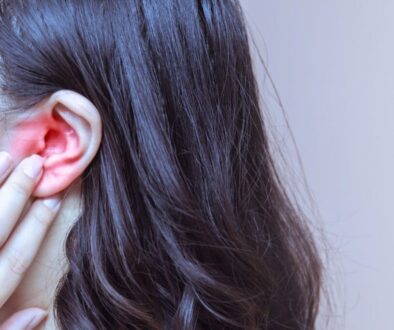Can Sinus Infection Mess With Your Eyes?

Published October 25, 2022
Sinuses are a series of interconnected hollow cavities found in the skull.
Their primary function is to constantly produce mucus, which moisturizes the insides of our noses. This mucus serves as a protective layer for the nose from external pollutants like dust, dirt, and allergens.
In addition, sinuses humidify the air we breathe in and improve our voice quality. Since they’re located mostly around the nose, it’s a common misconception that sinuses only affect the nasal cavity or nose.
That’s not the case at all. Sinuses extend behind the nose, in the cheekbones, the low center of your forehead, and between the eyes, which begs the question: can sinus infection mess with your eyes?
Can Sinus Infection Mess With Your Eyes?
Yes, it can. Due to their position in the skull, our sinuses have a direct effect on our eyes. When you feel pressure or pain behind your eyes, this problem may not be one with them but with your sinuses.
The primary symptom that this is a sinus problem and not an eye one is the feeling of pressure behind your eyes. Eye problems can lead to eye pain and impaired vision, but they rarely cause pressure.
Not even glaucoma – an eye disease caused by excessive pressure – doesn’t cause a feeling of pressure.
Since sinus infection can mess with not one, but two parts of the body, preventing it is crucial.
What Causes My Sinuses To Be Infected?
Infection in the sinuses, or sinusitis, happens when harmful bacteria or viruses make their way into the sinuses. These cause your sinuses to become inflamed, which consequently blocks mucus from draining.
As a result, mucus may build up in your sinuses.
How Can You Tell If You Have A Sinus Infection?
As with any other disorder, the best way to diagnose oneself is through symptoms. According to the Center for Disease Control and Prevention, the following are common symptoms of a sinus infection:
- Bad breath
- Cough
- Facial pain or pressure
- Headache
- Mucus dripping down the throat (post-nasal drip)
- Runny nose
- Sore throat
- Stuffy nose
Several risk factors also contribute to higher chances of getting sinus infections:
- Common cold
- Allergic conditions like hay fever
- Smoking cigarettes and exposure to secondhand smoke
- A weakened immune system
- Structural problems within the sinuses
Most sinus infections are viral in nature, so they’ll resolve themselves in a week or two without treatment, but that depends on the type of infection. Certain types of sinus infection last longer than others.

What Are The Common Types Of Sinus Infections?
Acute Sinusitis
Acute sinusitis has the shortest duration among these. A viral infection brought by the common cold or seasonal allergies like hay fever can cause acute sinusitis and it typically lasts up to two weeks.
Subacute Sinusitis
Subacute sinusitis is simply a longer version of acute sinusitis. This particular type can cause symptoms that last for up to three months. Its leading causes are bacterial infections and seasonal allergies.
Chronic Sinusitis
Chronic sinusitis symptoms persist for more than three months at a time. In rare cases, chronic sinusitis can cause five types of orbital complications (relating to the eye cavity). Here’s a look at each type:
-
Preseptal Cellulitis
Preseptal cellulitis is the infection of the tissues surrounding your eyes. This condition leads to redness and swelling of the eyelid and other surrounding skin.
-
Orbital Cellulitis
Orbital cellulitis is the inflammation of eye tissues behind the orbital septum. It is a serious infection to the muscle and fat around the orbit.
-
Subperiosteal Abscess
Subperiosteal abscess is a condition that usually presents itself as a collection of pus in between the periorbital and papyracea, which results from the migration of infection like sinusitis.
-
Orbital Abscess
Orbital abscess is a severe infection to the orbit. More severe cases can lead to vision loss and even death.
-
Cavernous Sinus Thrombosis
Cavernous sinus thrombosis is a blood clot in the cavernous sinuses. If left untreated, it can be life-threatening. Its main symptoms include a sharp headache, bulging eyeballs, and severe eye pain.
Treatment Of Sinus Infections
To relieve yourself of the eye pain, you must treat the underlying condition in the sinus infection. The following are some of the well-known and effective remedies for sinus infections:
- Antihistamines
- Nasal decongestant sprays
- Antibiotics
- Topical nasal corticosteroids
- Nasal saline washes
- Surgery
When Should You Call A Doctor?
Below are several signs that you must call your doctor for help with your sinus infection:
- You’re suffering from severe symptoms (severe facial pain or headache)
- The symptoms would worsen after improving
- The symptoms aren’t getting any better
- You got a fever for over three days at some point
Benefit From The Latest Advancements In Probiotic Science With Bionaze
Bionaze is a proprietary blend of probiotics proven to promote ear, nose, and throat health, improve digestion, and support your immune system. The active ingredients BLIS K12, and BL-04 are considered among the best probiotics according to science.
Get 25% Off Your First Order when you use BIO25 at checkout!

This Content Has Been Reviewed For Factual Accuracy
This content has undergone thorough fact-checking by our team of internal experts. Learn more about the meticulous editorial standard for our website here.
ADVERTISEMENT

About The Author
Lenard Arceo is an experienced writer who enjoys learning to code in his spare time. He has a fascination with health and nutrition and enjoys sharing his knowledge and research. He is proud of his commitment to communicating factual content that has helped his readers with life changing choices over the years.




